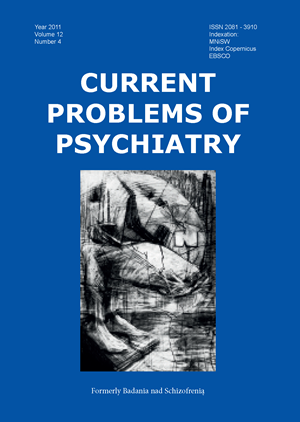Gender and severity of symptoms of mobile phone addiction in Polish gymnasium, secondary school and university students
Keywords:
addiction to the mobile phone, gender, adolescentsAbstract
The risk of mobile phone addiction and the addiction itself represent an ever larger psychological and social problem pointed out by psychiatrists, psychologists and educationalists.
Addiction to the mobile phone is not a homogeneous phenomenon, and, therefore, some researchers distinguish among addiction to sending and receiving text messages, addiction to voice calls and addiction to mobile phone features and mobile phone games.
Pawłowska and Potembska, based on a study of a group of Polish adolescents, have distinguished four dimensions of mobile phone addiction which form the scales of their Mobile Phone Addiction Assessment Questionnaire (Kwestionariusz do Badania Uzależnienia od Telefonu Komórkowego, KBUTK). These dimensions cover symptoms of 1/ addiction to mobile phone features, 2/ addiction to voice calls and text messages, 3/ trying to meet the need for acceptance and closeness by establishing social relatonships using phone calls and text messages, and 4/ preference for communicating and expressing emotions through text messages and phone calls over face-to-face communication.
In the literature, studies are available which show that the predisposition towards the individual types of mobile phone addiction is gender-related. Therefore, the aim of the present study was to provide an answer to the question of whether, and what, differences occur between women and men in the severity of symptoms of mobile phone addiction?
The study included a total of 493 persons, among which there were 99 gymnasium students (65 girls and 36 boys) aged 13 to16 years, 186 secondary school students (124 girls and 62 boys) aged 17 to 19 years and 208 university students (140 women and 68 men) aged 20 to 22 years.
The study was conducted using a socio-demographic questionnaire and the Mobile Phone Addiction Assessment Questionnaire (KBUTK) by Potembska and Pawłowska.
A t-test comparison of the scores obtained by the surveyed women and men on KBUTK scales afforded the following conclusions:
- Women significantly more frequently than men use the mobile phone to satisfy their need for acceptance and closeness, to establish and maintain social relationships and to express their emotions.
- Women are characterized by a higher severity of symptoms of addiction to voice calls and text messages than men.
- Men significantly more frequently than women use the mobile phone to listen to music, take pictures and videos, play games, and connect to the Internet.
References
1. Young K. Internet can be a addicting as alcohol, drugs and gambling, says new research. Pittsburgh, University of Pittsburgh Press, 1996.
2. Augustynek A. Psychologiczne aspekty korzystania z Internetu. Formowanie się społeczności informacyjnej. Kraków: Tekst-Graf; 2003.
3. American Psychiatric Association. Diagnostic and statistical manual of mental disorders (4th ed.). Washington (DC), American Psychiatric Association. Text Revision, 2000.
4. Potembska E., Pawłowska B. Właściwości psychometryczne Kwestionariusza do Badania Uzależnienia od Telefonu Komórkowego (KBUTK). Bad. nad Schizofrenią, 2009; 10: 322-329.
5. Guerreschi C. Nowe uzależnienia. Kraków; 2005.
6. Bianchi A., Phillips J.G. Psychological Predictors of Problem Mobile Phone Use. Cyberpsychol. Behav., 2005; 8(1): 39-51.
7. Igarashi T., Takai J., Yoshida T. Gender Differences in Social Network Development via Mobile Phone Text Messages: A Longitudinal Study. J. Soc. Pers. Relat., 2005; 22(5): 691-713.
8. Doring N., Hellwig K., Klimsa P. Mobile communication among German youth. Nyiri K. Ed., A sense of place: The global and the local in mobile communication., Vienna; Austria: Passagen Verlag, 2005, pp. 209-217.
9. Ling R. Students girls and young adult men: Two subcultures of the mobile telephone. Estudios de Juventud, 2002; 57: 33-46.
10. Wilska T.A. Mobile Phone Use as Part of Young People’s Consumption Styles. J. Cons. Policy, 2003; 26(4): 441-463.
11. Economides A.A., Grousopoulou A. Use of mobile phones by male and female Greek students. International Journal of Mobile Communications (IJMC), 2008; 6(6): 729-749.


